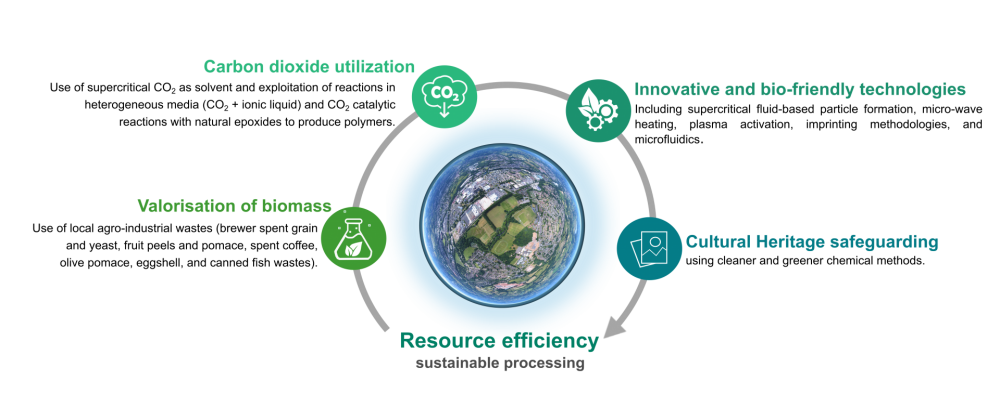 Augusto Tomé
actome@ua.pt
Augusto Tomé
actome@ua.pt
The research line Sustainable Chemistry and Technology aims at addressing some of the most pressing global challenges we face today, ranging from environmental degradation to resource depletion and public health concerns prioritizing environmental and societal well-being throughout chemical processes by minimizing the environmental impact of chemical production and product lifecycles.
New approaches are required to meet the needs of the present without compromising the ability of future generations to reach their own needs. Key principles include the reduction of production and emission of pollutants by using renewable and non-toxic materials, development of cleaner production methods, renewable energy integration and carbon capture technologies, thereby minimizing exposure risks for workers, consumers, and communities. Attaining this general goal requires solid interdisciplinary research, only possible by conjugating knowledge across disciplines from Chemistry, Biochemistry, Materials Science & Engineering and Environmental and Biomedical Sciences. Interdisciplinary research helps to identify opportunities for improvement and optimization of processes in a lifecycle perspective, i.e., from raw materials extraction to end-of-life disposal.
This research line integrates various research groups of LAQV-REQUIMTE that are committed to develop collaborative work aiming to offer to the community innovative molecules, materials and processes attained via sustainable approaches that fall within the principles of Green Chemistry. The research line Sustainable Chemistry and Technology deals with a diversity of key topics centered in the development of new synthetic methods (including catalytic transformations and alternative solvents) and exploitation of natural resources for innovative and novel molecules, using biomass in a biorefinery perspective for the design of advanced functional, smart and
responsive (nano)systems, as well as molecular imprinted systems with supercritical fluids and for conservation and restoration of cultural heritage; to environmental protection (including air, soil, water quality and pollution control, water and soil remediation, waste valorization); exploring alternative energy sources reducing reliance on fossil fuels and lowering greenhouse gas emissions; coupled with modelling and optimization of separation processes, and computational systems and artificial intelligence for chemical and biological technology.
Within the Sustainable Chemistry and Technology research line we are committed to addressing environmental challenges and advancing to a more sustainable future. By integrating principles of green chemistry, catalysis, materials science, energy efficiency, and life cycle assessment, this field is driving innovation toward cleaner, safer, and more environmentally friendly chemical processes and products.
